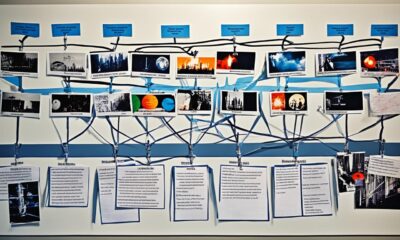Narcissism Test
Are You Dating a Narcissist? Take This Quiz
Navigating the complexities of narcissism in marriage? Take the quiz to uncover the answer to the question on your mind.

When we start to see a recurring trend of our significant other consistently minimizing our accomplishments and ignoring our emotions, it can signal a warning to us. This leads us to question, ‘Have I wed a narcissist?’ The consequences of pondering this question are significant, impacting our mental health and the solidity of our partnership.
But before jumping to conclusions, it's crucial to understand what narcissism truly entails and how it may manifest in a marriage. Let's explore this complex issue together and shed light on navigating the complexities of such dynamics within a marital relationship.
Key Takeaways
- Recognizing patterns of excessive self-confidence and a constant need for admiration.
- Identifying a lack of empathy and manipulative tendencies in a spouse.
- Understanding the importance of seeking support and setting boundaries when dealing with a narcissistic spouse.
- Seeking professional guidance and therapy for valuable insights and strategies in navigating narcissistic dynamics.
Recognizing Narcissistic Behaviors
Recognizing narcissistic behaviors involves observing patterns of excessive self-confidence, constant need for admiration, lack of empathy, manipulative tendencies, and difficulty in accepting criticism or accountability. These traits are key indicators that could signal someone may be dealing with a narcissist in their relationship. A partner who exhibits these behaviors may be emotionally harmful, creating a toxic relationship dynamic. Understanding the nuances of narcissistic traits is crucial for maintaining emotional health within a partnership.
When faced with potential narcissistic behaviors in a partner, it's essential to seek guidance from a qualified mental health professional. They can provide valuable insights into navigating the complexities of dealing with a narcissist. Taking a Narcissistic Personality quiz may also shed light on the situation, helping individuals gain clarity on the dynamics at play in their relationship. By being aware of these red flags, one can better protect themselves from potential emotional harm that may arise in a relationship with a narcissist.
Signs of Narcissism in Marriage

In marriage, identifying signs of narcissism can be crucial for maintaining emotional well-being and relationship health. Recognizing these signs is essential for understanding the dynamics of being Married to a Narcissist.
Here are four key indicators of signs of narcissism in marriage:
- Constant need for admiration and attention: A narcissistic partner may constantly seek praise and validation, making it challenging to meet their insatiable appetite for admiration.
- Lack of empathy towards others, including their spouse: Empathy is often lacking in someone with narcissistic tendencies, leading to a lack of understanding or consideration for their partner's feelings.
- Manipulative behavior to control and dominate their partner: Narcissists may use manipulation tactics to maintain control over their spouse, leading to power imbalances and emotional abuse.
- Difficulty accepting criticism or taking responsibility for their actions: Individuals with narcissistic traits often struggle to acknowledge their faults or mistakes, deflecting blame onto others and avoiding accountability for their behavior.
Understanding Narcissistic Traits
Having established the key indicators of narcissism in marriage, it becomes imperative to delve into the understanding of narcissistic traits to comprehend the complexities underlying such behaviors.
Narcissistic individuals exhibit a range of characteristics that can be deeply damaging to relationships. They often have dominant personalities, seeking to control and manipulate their partners to fulfill their own needs and desires. This behavior can stem from various underlying factors such as suffering from emotional abuse, having unresolved daddy issues, or experiencing abuse by their parents.
The lack of empathy in narcissists further exacerbates the situation, as they struggle to understand or care about the feelings and needs of others. These individuals often have fragile self-esteem and constantly seek admiration and attention from those around them.
Understanding these narcissistic traits and tendencies is crucial in identifying whether one's partner is a narcissist, as recognizing these behaviors is the first step towards addressing the challenges they bring to a relationship. Taking a quiz can help individuals assess the dynamics of their relationship and determine if further action is necessary to protect their mental health.
Dealing With a Narcissistic Spouse

To effectively navigate a relationship with a narcissistic spouse, establishing clear boundaries and practicing assertiveness is crucial in safeguarding oneself from manipulation and control. Here are four key strategies to help you deal with a narcissistic partner:
- Seek Support: Surround yourself with a strong support system of friends, family, or therapists who can offer emotional support and guidance during challenging times.
- Prioritize Self-Care: Engage in self-care activities to nurture your emotional well-being and bolster your self-esteem, helping you cope with the demands of being in a relationship with a narcissistic spouse.
- Educate Yourself: Take the time to learn about narcissism and its impact on relationships. Understanding the behavior patterns and effects can empower you to navigate the situation more effectively.
- Consider Therapy: Individual or couples therapy can provide a safe space to address issues stemming from the relationship with a narcissistic partner and explore potential paths for healing and growth.
Seeking Help for Narcissistic Dynamics
Navigating a relationship with a narcissistic spouse can often necessitate seeking professional guidance and support to address the complexities of narcissistic dynamics. When considering seeking help for narcissistic dynamics, it's crucial to recognize the signs of narcissistic personality disorder.
Some questions to ponder include whether you find yourself constantly looking for approval from your spouse, feeling like you're constantly in a Dominant or Submissive role, or if you have concerns about patterns that may impact your interactions with Future Husbands.
Seeking medical advice or therapy can provide valuable insights and strategies for managing the challenges associated with being married to a narcissist. It's important to remember that professionals trained in dealing with narcissistic personalities can offer tools and support to navigate these complex dynamics effectively.
Frequently Asked Questions
How Do I Know if I Was Married to a Narcissist?
We can identify if we were married to a narcissist by looking for signs like extreme self-centeredness and a lack of empathy. This behavior can leave us feeling emotionally drained and isolated.
It's crucial to compare our experiences with what a healthy relationship should entail, like mutual respect and open communication.
Seeking support through therapy, support groups, or creating a strong support system is essential.
Self-care, setting boundaries, and considering ending the relationship if necessary are vital steps in this process.
What Kind of Woman Does a Narcissist Marry?
When a narcissist seeks a partner, they often look for someone who can boost their ego and cater to their needs. They may target individuals who are empathetic, nurturing, and willing to prioritize their partner's desires over their own.
This dynamic allows the narcissist to maintain control and feel superior in the relationship. Over time, the narcissist's partner may feel drained, unfulfilled, and trapped in a one-sided dynamic.
How Do Narcissist Treat Their Wives?
Narcissists treat their wives with a lack of empathy, resorting to manipulation, control, and prioritizing their own needs over their partners'. Criticism, devaluation, emotional abuse, and isolation are common tactics used to maintain power in the relationship.
This behavior leads to emotional exhaustion, low self-esteem, and feelings of fear and entrapment. Recognizing these patterns is crucial for individuals in such relationships to seek support and potentially break free from the cycle of abuse.
Who Does a Narcissist Choose to Marry?
We believe that narcissists often choose partners who provide them with admiration, validation, and a sense of power. They may target individuals with low self-esteem, trauma history, or dependency, as these traits make it easier for the narcissist to manipulate and control the relationship.
Additionally, narcissists may be drawn to partners with high social status or success to enhance their own image. Influence over easily swayed or non-assertive partners also allows them to maintain dominance.
Conclusion
In conclusion, identifying narcissistic behaviors in a marriage is crucial for one's mental well-being.
Just as a flower needs sunlight and water to thrive, a healthy relationship requires mutual respect and empathy.
Recognizing the signs of narcissism can empower individuals to seek help and make informed decisions about their future.
Remember, it's okay to prioritize your own happiness and leave a toxic relationship behind. Seek support, prioritize self-care, and remember that you deserve to be treated with love and respect.
Our Content Strategist, Jordan, has a knack for deciphering the digital landscape to determine what our audience seeks. With a foundation in behavioral science and digital marketing, Jordan crafts our content strategy, ensuring that our topics are relevant, research-based, and resonant. Their strategic approach helps Narcissistic Man reach hearts and minds across the globe.
Narcissism Test
Discover Your Inner Narcissist: You Quiz
Intrigued to uncover hidden traits? Take the 'How Narcissist Are You Quiz' and delve into the spectrum of narcissistic tendencies.

Have you ever thought about how self-awareness can shed light on different aspects of our personalities in our everyday interactions? Do you ever wonder how your level of self-reflection compares to that of others?
The 'How Narcissist Are You Quiz' unveils a spectrum of narcissistic tendencies that might surprise you. Let's explore how this quiz can offer a glimpse into our psyche and potentially challenge our perceptions of self-image.
Key Takeaways
- Online quizzes are not diagnostic tools for narcissistic personality disorder.
- Self-reflection allows introspection and analysis of actions, thoughts, and emotions.
- Analyzing conduct provides valuable insights and fosters healthier relationships.
- Seek guidance from mental health professionals for understanding and addressing tendencies.
Understanding Narcissism Through a Quiz
Exploring narcissism through a quiz can provide insights into the traits associated with narcissistic personality disorder. Narcissistic traits such as grandiosity, lack of empathy, and manipulation are often fundamental aspects of this disorder. By engaging with a narcissism quiz, individuals may gain a better understanding of these characteristics and how they manifest in their own behavior.
While such quizzes can serve as a preliminary screening tool, it's essential to recognize their limitations. Online quizzes aren't diagnostic tools and shouldn't be solely relied upon for a definitive diagnosis of narcissistic personality disorder. Instead, they can prompt individuals to reflect on their behaviors and seek further evaluation from mental health professionals if necessary.
To truly comprehend the complexities of narcissistic personality disorder, one must undergo a comprehensive assessment by a qualified specialist. Seeking professional help is crucial for an accurate diagnosis and the development of an appropriate treatment plan tailored to the individual's specific needs and circumstances.
Self-Reflection on Narcissistic Behaviors

After considering the limitations of online quizzes in diagnosing narcissistic personality disorder, it becomes imperative to engage in self-reflection on our own behaviors that may align with narcissistic traits. Self-reflection allows us to introspect and analyze our actions, thoughts, and emotions for signs of narcissistic tendencies. To aid in this process, a structured approach can be helpful. The table below outlines key behaviors associated with narcissistic personality disorder for self-assessment:
| Narcissistic Behavior | Description | Self-Reflection |
|---|---|---|
| Grandiosity | Exaggerated sense of self-importance | Have I displayed an inflated ego? |
| Lack of Empathy | Difficulty understanding others' feelings | Have I been insensitive to others' emotions? |
| Need for Admiration | Constant seeking of praise and admiration | Do I constantly seek validation from others? |
| Sense of Entitlement | Belief in special treatment and privileges | Have I expected special treatment in situations? |
Analyzing our conduct through this lens can provide valuable insights into our personalities and help in fostering healthier relationships.
Exploring Narcissistic Tendencies Together
Together, we'll delve into the manifestations of narcissistic tendencies within interpersonal relationships to enhance our understanding and foster a supportive environment for growth.
When exploring narcissistic behaviors in relationships, it's crucial to distinguish between normal self-interest and the traits associated with Narcissistic Personality Disorder (NPD). Individuals with NPD often exhibit a grandiose sense of self-importance, a constant need for admiration, and a lack of empathy for others. These characteristics can significantly impact how they interact with those around them, leading to strained relationships and emotional distress for both parties involved.
In today's digital age, social media platforms can amplify narcissistic tendencies, providing individuals with NPD a stage to seek validation and attention on a broader scale. The instant gratification and validation received through likes, comments, and followers can fuel their narcissistic traits, reinforcing their belief in their superiority and entitlement.
Assessing Your Narcissistic Traits

Within interpersonal relationships, understanding and recognizing one's narcissistic traits is essential for fostering personal growth and maintaining healthy dynamics. When assessing your narcissistic tendencies, it's crucial to approach the evaluation with a reflective and open mindset. Here are some key points to consider:
- Causes of Narcissistic Personality: Delve into the root causes that may have contributed to the development of narcissistic traits, such as childhood experiences or past relationships.
- Consulting a Mental Health Professional: Seeking guidance from a mental health professional can provide valuable insights and support in understanding and addressing narcissistic tendencies.
- Inflated Sense of Self-Importance: Reflect on instances where you may have exhibited an inflated sense of self-importance or a constant need for admiration from others.
- Impact on Interpersonal Relationships: Evaluate how your narcissistic traits impact your relationships with others and consider the feedback you receive from those around you.
- Self-Reflection and Growth: Engage in self-reflection to identify areas for personal growth and work towards cultivating healthier relationship dynamics.
Insights Into Your Personality: The Narcissism Quiz
The Narcissism Quiz provides a structured assessment tool to evaluate narcissistic behaviors and offer insights into one's personality. By answering a series of multiple-choice questions that reflect narcissistic tendencies, individuals can gain a better understanding of their own behavior patterns.
This quiz isn't a diagnostic tool for Narcissistic Personality Disorder (NPD) but can help determine whether certain traits align with narcissistic characteristics inspired by Greek mythology.
The results of the quiz are anonymous, allowing participants to reflect on their responses without fear of judgment. It's essential to approach the findings with an open mind and consider seeking guidance from a mental health professional if concerns about narcissistic traits arise.
Frequently Asked Questions
How Do You Check if You Are a Narcissist?
We assess narcissistic tendencies by reflecting on our behaviors, thoughts, and interactions with others. Observing how we prioritize our own needs over those of others, seek excessive admiration, or lack empathy can provide insights.
Engaging in self-reflection, seeking feedback from trusted individuals, and considering professional evaluation are valuable steps in evaluating potential narcissistic traits.
Awareness and willingness to address these aspects can be crucial for personal growth and healthier relationships.
What Is the One Question to Identify a Narcissist?
We can identify a potential narcissist by asking if they believe they're more special or unique than others. A resounding 'yes' to this question may indicate narcissistic tendencies.
It's important to distinguish between healthy self-esteem and exaggerated self-importance. However, this question alone isn't a definitive diagnosis of narcissistic personality disorder.
Seeking a professional evaluation from a mental health expert is crucial for an accurate assessment.
What Words Can Destroy a Narcissist?
We've explored how criticism, rejection, ignoring, accountability, and empathy can deeply affect a narcissist. These words have the power to pierce through their facade of superiority and self-centeredness, challenging their fragile ego and sense of self-worth. Understanding these triggers can help us navigate interactions with narcissistic individuals more effectively, promoting healthier relationships and boundaries.
It's crucial to approach such situations with empathy and caution, recognizing the complexities at play.
Can a Narcissist Cry Easily?
Yes, narcissists can cry, but it's typically not genuine. Their tears often serve a manipulative purpose, such as to elicit sympathy or control others. When they do cry, it's usually driven by self-pity or to further their own agenda.
These emotional displays are short-lived and quickly revert back to their self-centered focus.
It's essential to recognize that not all individuals who cry easily exhibit narcissistic traits, as crying is a normal and healthy response.
Conclusion
In conclusion, taking the 'How Narcissist Are You Quiz' can provide valuable insights into your level of narcissism.
It's important to remember that self-awareness is key to personal growth and building healthy relationships.
Just like a mirror reflecting our inner selves, this quiz serves as a tool to help us understand and address our behaviors.
Remember, seeking professional help is always recommended for accurate diagnosis and treatment.
Our Content Strategist, Jordan, has a knack for deciphering the digital landscape to determine what our audience seeks. With a foundation in behavioral science and digital marketing, Jordan crafts our content strategy, ensuring that our topics are relevant, research-based, and resonant. Their strategic approach helps Narcissistic Man reach hearts and minds across the globe.
Narcissism Test
Am I in a Relationship with a Narcissist Quiz: 10 Telltale Signs
Mysterious signs in your relationship – could your partner be a narcissist? Unravel the clues in this intriguing quiz.

As we delve into the complexities of personal relationships, we often analyze particular behaviors and patterns that could lead to concerns.
Have you ever wondered if your partner's actions stem from genuine care or a deeper, more concerning place? The journey of self-discovery within a relationship can sometimes lead us to unexpected revelations.
In the realm of interpersonal dynamics, understanding the subtle nuances can be pivotal. Perhaps it's time to explore a different perspective that might shed light on the intricacies of your connection.
Key Takeaways
- Recognizing red flags and early signs is crucial in protecting oneself.
- Understanding the impact of the relationship on one's well-being is important.
- Seeking professional guidance can provide insight and coping strategies.
- Setting boundaries, improving communication, and self-care are essential in dealing with narcissists.
Common Traits of Narcissists
Narcissists demonstrate a self-centered focus and prioritize their own needs and desires above all else. Their inclination towards self-absorption often overshadows any consideration for others in relationships.
In the context of a relationship quiz aimed at identifying potential narcissistic traits, recognizing these common characteristics is crucial. Understanding that a narcissist craves external validation and seeks constant admiration can shed light on the dynamics within a relationship.
This insatiable need for attention may manifest in various ways, impacting the quality of interactions and connections with others. Additionally, their struggle with empathy poses a significant challenge in fostering healthy and mutually fulfilling relationships. The inability to comprehend or resonate with others' emotions can lead to misunderstandings and conflicts.
Recognizing Red Flags

In identifying red flags of narcissistic relationships, one must pay attention to subtle behavioral patterns and interactions that signal potential issues. Recognizing these signs early on can help individuals protect themselves from falling into a harmful relationship dynamic. Here are four key red flags to watch out for:
- Excessive Need for Validation and Attention: A narcissist often craves constant affirmation and validation from others, seeking attention to boost their ego.
- Lack of Empathy and Disinterest in Others' Lives: Individuals with narcissistic personality disorder typically show a lack of empathy towards others, focusing solely on their own needs and desires.
- Constant Self-Centered Behavior: Narcissists tend to dominate conversations, consistently steering the topic back to themselves, and seeking admiration from those around them.
- Lowering Self-Esteem Through Criticism: Criticism and put-downs aimed at diminishing your self-worth are common tactics used by narcissists to maintain control and power in the relationship.
Relationship Dynamics Assessment
The assessment tool for evaluating relationship dynamics with potential narcissistic individuals offers a structured approach to recognizing behavioral patterns and red flags. When assessing relationship dynamics with a possible narcissist, it is crucial to understand the distinction between narcissistic tendencies and Narcissistic Personality Disorder (NPD). This quiz serves as a guide to help individuals gain self-awareness and insight into their relationships, shedding light on potential toxic dynamics. Below is a table summarizing key aspects of the Relationship Dynamics Assessment:
| Key Aspect | Description | Importance |
|---|---|---|
| Recognition of Red Flags | Identifying behaviors indicative of narcissistic traits | Vital for early intervention |
| Differentiation from NPD | Distinguishing between narcissistic tendencies and a full-blown Narcissistic Personality Disorder | Aids in understanding severity levels |
| Self-Reflection | Encouraging introspection to assess personal feelings and boundaries | Promotes self-awareness |
| Relationship Impact Assessment | Evaluating how the relationship with a potential narcissist affects one's well-being | Crucial for decision-making |
| Guidance on Moving Forward | Providing resources and support for individuals in toxic relationships | Empowers individuals to seek help |
Signs of Narcissistic Behavior

After evaluating relationship dynamics with potential narcissistic individuals, understanding the signs of narcissistic behavior becomes essential for recognizing red flags and potential toxicity in relationships.
- Narcissists create a self-serving experience, prioritizing their needs and desires above others in a relationship.
- They thrive on external validation, constantly seeking praise and admiration to boost their fragile self-esteem.
- Narcissists struggle with empathy, finding it challenging to understand or connect with others' emotions.
- They may seem disinterested in others' lives, focusing primarily on themselves and their own interests rather than engaging in meaningful interactions with their partner.
Recognizing these signs can help individuals assess whether they're in a relationship with a narcissist and take steps to protect their well-being. Understanding the complexities of narcissistic personality disorder is crucial in navigating narcissistic relationships effectively.
Seeking Professional Guidance
Seeking professional guidance when navigating relationships with potential narcissists is crucial for gaining insight and developing effective coping strategies. A mental health professional can offer valuable support in understanding the complexities of dealing with someone who exhibits narcissistic personality traits. These professionals are trained to recognize patterns of behavior indicative of narcissism and can provide a thorough assessment to determine the extent of these traits in your relationship. It's important to note that only a qualified mental health professional can diagnose someone with a narcissistic personality disorder.
A mental health professional can also help you navigate the emotional challenges that often accompany relationships with individuals displaying narcissistic behaviors. They can assist in setting boundaries, improving communication strategies, and enhancing self-care practices. Additionally, therapy can provide a safe space for you to process your feelings, validate your experiences, and explore healthier ways of interacting within the relationship.
Seeking professional guidance is a proactive step towards gaining clarity and developing effective strategies for managing a relationship with a potential narcissist.
Frequently Asked Questions
How Do I Know if I Am in a Relationship With a Narcissist?
We can identify whether we're in a relationship with a narcissist by observing consistent patterns of behavior. Key signs include excessive need for admiration, lack of empathy, manipulation, and a grandiose sense of self-importance.
These traits often manifest in a lack of accountability and constant validation-seeking. It's essential to recognize these behaviors early on to protect our emotional well-being and establish healthy boundaries.
Self-awareness and understanding these signs can empower us to make informed decisions.
How Do You Test if Your Partner Is a Narcissistic?
Testing for narcissism in a partner involves observing behaviors over time. This includes noting patterns of self-centeredness, lack of empathy, and manipulation. It's important to look for signs of grandiosity, such as a constant need for admiration and a tendency to exploit others for personal gain.
When observing these behaviors, it's essential to approach the situation with caution. Seeking professional guidance can be helpful in navigating complex relationships and understanding the dynamics at play.
How Do Narcissists Treat Their Partners?
Narcissists often treat their partners in a self-serving manner, prioritizing their own needs and seeking constant admiration. They may lack empathy, appear disinterested in their partner's emotions, and manipulate situations to feel superior.
Belittling their partners, lowering self-esteem, and seeking validation through public displays are common behaviors. These actions can create a toxic dynamic, where the partner's well-being is overshadowed by the narcissist's constant need for attention and validation.
Am I the Victim or the Narcissist?
We can determine if we're the victim or the narcissist by reflecting on our behavior and feelings in the relationship. It's crucial to recognize patterns of manipulation, gaslighting, or lack of empathy that could indicate narcissistic tendencies.
Seeking outside perspectives or professional guidance can provide clarity. Understanding our role in the dynamic is the first step towards healing and making informed decisions about the relationship's future.
Conclusion
In conclusion, taking the 'Am I in a Relationship With a Narcissist Quiz' can shine a light on potential red flags and help individuals evaluate their relationship dynamics.
It's crucial to recognize signs of narcissistic behavior and seek professional guidance if needed. Remember, it's okay to prioritize your well-being and leave an unhealthy relationship.
Trust your instincts and take the necessary steps towards a healthier and happier future.
Our Content Strategist, Jordan, has a knack for deciphering the digital landscape to determine what our audience seeks. With a foundation in behavioral science and digital marketing, Jordan crafts our content strategy, ensuring that our topics are relevant, research-based, and resonant. Their strategic approach helps Narcissistic Man reach hearts and minds across the globe.
Narcissism Test
Is My Mum a Narcissist Quiz: Assess Your Mother’s Behavior
Journey into self-discovery and uncover potential narcissistic traits in your mother with the 'Is My Mum a Narcissist Quiz' – could it reveal eye-opening insights?

Exploring the complexities of familial dynamics can be challenging, particularly when attempting to pinpoint distinct behaviors. But have you ever considered if your mother’s actions might suggest narcissistic traits?
The 'Is My Mum a Narcissist Quiz' offers a structured approach to evaluating potential narcissistic tendencies in maternal figures. Exploring this quiz might shed light on patterns of behavior that could be impacting your relationship in ways you may not have fully realized.
Key Takeaways
- Recognize signs of narcissistic behavior in your mother.
- Understand the impact of narcissistic traits on relationships and well-being.
- Seek help and support from a therapist or counselor.
- Prioritize your mental well-being and surround yourself with a supportive network.
Signs of Narcissistic Behavior
In identifying signs of narcissistic behavior, individuals may observe a pattern of self-centeredness and a lack of empathy in the person's interactions and relationships. A narcissist mother may react to situations with an excessive focus on herself, often seeking admiration and validation while disregarding the feelings and needs of those around her. Understanding these behaviors is crucial in determining whether one is dealing with a narcissistic individual.
When considering if a mother's actions align with narcissistic traits, it's important to look for consistent patterns of behavior rather than isolated incidents. This quiz can help individuals find clarity in understanding the dynamics of their relationship and whether further help or support is needed.
Blaming oneself for the mother's actions isn't uncommon, but recognizing the signs of narcissism can empower individuals to seek the care and assistance required to navigate such challenging relationships effectively.
Understanding Narcissistic Traits

Considering the signs of narcissistic behavior observed in individuals, understanding narcissistic traits involves recognizing patterns of self-centeredness and a lack of empathy in interactions and relationships.
- Lack of Empathy: Narcissistic mothers often struggle to empathize with others' feelings and perspectives, prioritizing their own needs above all else.
- Manipulative Behavior: They may use manipulation tactics to control situations and people around them, seeking validation and admiration constantly.
- Sense of Entitlement: Narcissistic mothers often exhibit a strong sense of entitlement, believing they deserve special treatment and attention without reciprocating.
Understanding these traits can help individuals navigate relationships with narcissistic mothers. Setting boundaries, seeking support, and practicing self-care are crucial strategies.
It's essential to handle difficult conversations with tact and to outsmart a narcissistic mother by staying calm and assertive. Seeking professional help can also provide valuable guidance in protecting oneself from emotional harm.
Identifying Narcissistic Patterns
Identifying narcissistic patterns involves recognizing recurring behaviors characterized by self-centeredness and a lack of empathy in interpersonal dynamics. These patterns often manifest in traits such as a constant need for admiration, a sense of entitlement, and a tendency to manipulate others for personal gain.
Individuals with narcissistic behaviors may exhibit a lack of empathy towards others, viewing them as mere instruments to fulfill their own needs and desires. In the context of a parent-child relationship, narcissistic patterns can be especially harmful, leading to emotional manipulation, neglect of the child's needs, and a focus on maintaining their own self-image above all else.
When trying to identify these patterns, it's essential to look for consistent behaviors rather than isolated incidents. Pay attention to how the parent interacts with others, their reactions to criticism or perceived slights, and their overall attitude towards empathy and understanding.
Impact on Relationships and Well-being

Having identified narcissistic patterns in a parent-child relationship, understanding the impact on relationships and well-being becomes crucial for establishing healthy boundaries and fostering personal growth.
- Emotional Drain: Dealing with a parent exhibiting narcissistic traits can leave individuals feeling emotionally drained due to constant manipulation and lack of empathy. This can strain relationships and affect mental health.
- Fragile Egos: Narcissistic parents often have fragile egos, leading them to blame others for their shortcomings. This behavior can create tension in relationships and hinder personal well-being.
- Protect Mental Health: It's essential to prioritize one's mental health when navigating relationships with individuals displaying narcissistic traits. Seeking therapy, setting boundaries, and practicing self-care can help protect mental well-being and foster healthier connections.
Understanding the impact of narcissistic behaviors on relationships can empower individuals to set boundaries, prioritize self-care, and seek support to navigate challenging dynamics while safeguarding their mental health and overall well-being.
Seeking Help and Support
When faced with navigating a relationship with a narcissistic mother, seeking help and support is essential for maintaining emotional well-being and establishing boundaries. Taking an 'Is My Mum a Narcissist Quiz' could be the first step in identifying the traits of a narcissistic mother and understanding their impact on your life.
To handle difficult conversations and protect your mental health, seeking help from a therapist or counselor can provide valuable insights and coping strategies. It's crucial to recognize manipulative behaviors and practice self-compassion while finding ways to address and heal from the emotional wounds inflicted by a narcissistic mother.
Surrounding yourself with a supportive network of friends and loved ones can offer validation and comfort during challenging times. Engaging in activities that bring joy and relaxation, and taking breaks from interactions with your narcissistic mother when needed, are also important steps in safeguarding your emotional well-being.
Frequently Asked Questions
What Are the Signs of a Narcissistic Mother?
Signs of a narcissistic mother may include manipulation, lack of empathy, controlling behavior, and constant need for admiration.
These traits can lead to emotional abuse, feelings of inadequacy, and strained relationships.
It's important to recognize these behaviors and seek support to navigate the challenges they present.
What Are the Signs of a Narcissistic Mother Test?
We navigate the maze of narcissistic behaviors in a mother by observing key signs like constant need for admiration, lack of empathy, and manipulation.
Testing these traits involves assessing patterns of behavior over time to discern a consistent pattern.
Recognizing these signs empowers us to set boundaries and prioritize our well-being in challenging familial dynamics.
It's a road to self-discovery and growth, unveiling layers of complexity within the mother-child relationship.
How Narcissistic Mothers Treat Their Daughters?
Narcissistic mothers often treat their daughters with manipulation, emotional abuse, and a lack of empathy. They may prioritize their own needs and desires above their daughters', leading to feelings of neglect and invalidation.
These mothers may also engage in gaslighting and control tactics to maintain power and dominance over their daughters. Understanding these patterns can help daughters set boundaries, seek support, and prioritize their own well-being in the face of such challenging dynamics.
Is My Mother a Narcissist or Just Controlling?
We've struggled to distinguish between a controlling mother and a narcissistic one. Reflecting on behaviors and their impact can provide clarity.
One might feel suffocated and manipulated in a controlling relationship, while a narcissistic dynamic often involves lack of empathy and emotional manipulation for personal gain.
Seeking therapy and setting boundaries can aid in understanding and navigating these complex relationships. It's essential to prioritize self-care and seek support from understanding individuals.
Conclusion
In conclusion, taking the 'Is My Mum a Narcissist Quiz' can provide valuable insights into potential narcissistic behaviors exhibited by your mother.
By identifying these patterns, individuals can better understand the impact on their relationships and well-being.
Seeking professional help and support is essential in navigating this complex dynamic.
Remember, knowledge is power in dealing with challenging situations like this.
Our Content Strategist, Jordan, has a knack for deciphering the digital landscape to determine what our audience seeks. With a foundation in behavioral science and digital marketing, Jordan crafts our content strategy, ensuring that our topics are relevant, research-based, and resonant. Their strategic approach helps Narcissistic Man reach hearts and minds across the globe.
-

 How To Deal with Narcissism2 weeks ago
How To Deal with Narcissism2 weeks agoNarcissist Return Timeline: Factors & Predictions
-

 Covert Narcissist1 week ago
Covert Narcissist1 week agoThe Final Covert Narcissist Discard: Signs to Watch For
-

 Divorcing a Narcissist3 months ago
Divorcing a Narcissist3 months agoHealing Together: Support Groups for Narcissistic Abuse Survivors
-

 Covert Narcissist3 months ago
Covert Narcissist3 months ago10 Celebrities Who Display Covert Narcissist Behavior
-

 Narcissistic Cheating Patterns3 months ago
Narcissistic Cheating Patterns3 months agoUnveiling Habits: Cheating Narcissist at Home Post-Affair
-

 How To Deal with Narcissism4 weeks ago
How To Deal with Narcissism4 weeks agoOutsmarting a Narcissist in Court: Strategies to Beat Them
-

 Covert Narcissist1 week ago
Covert Narcissist1 week agoWhat Are the Signs of Covert Narcissist Stalking?
-

 How To Deal with Narcissism4 weeks ago
How To Deal with Narcissism4 weeks agoHow to Make a Narcissist Want You Sexually: A Step-by-Step Guide

















